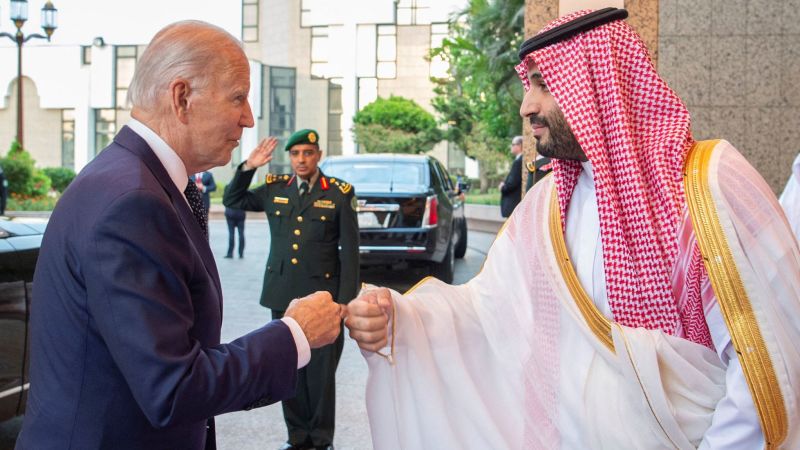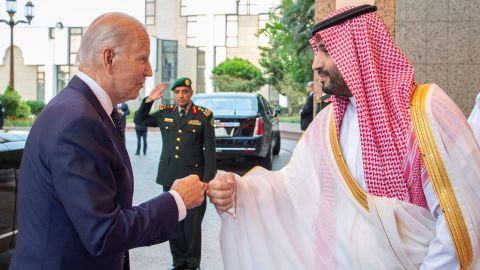
Editor’s Note: David A. Andelman, a contributor to CNN, twice winner of the Deadline Club Award, is a chevalier of the French Legion of Honor, author of “A Red Line in the Sand: Diplomacy, Strategy, and the History of Wars That Might Still Happen” and blogs at Andelman Unleashed. He formerly was a correspondent for The New York Times and CBS News in Europe and Asia. The views expressed in this commentary are his own. View more opinion at CNN.
CNN
—
So much for cozying up to the Saudis – President Joe Biden’s much-hyped fist bump with Mohammed bin Salman during a trip to the Middle East back in July has turned into something of a slap across the face from the crown prince.

This week’s OPEC+ announcement that it would be slashing oil production by 2 million barrels per day – engineered, by most accounts, by Saudi Arabia and Russia – is already provoking a cascade of toxic geopolitical shifts.
A host of issues all converge here at this epiphanal moment. There’s the European Union, which is suddenly having to work out how it might still implement its price cap on Russian crude.
There’s oil producer Venezuela, which with OPEC’s one stroke is looking to the US more like an attractive trading partner than a hemispheric pariah.
There’s the prospect of a resurgence of coal as a fuel and its impact on our entire planet.
And then there’s the jump in oil prices, a source of new revenues Russia so desperately needs to continue its war in Ukraine, where a lightning counteroffensive is hurting President Vladimir Putin on the battlefield and at home.

For now, the most immediate fallout will be on oil prices and revenues. Designed to spur a reversal of the trend that has sent oil prices plummeting to $80 a barrel from just over $130 a barrel in March, the impact on prices at the gas pump and on inflation in the United States on the eve of mid-term elections is already being felt.
Oil monitor Platts pegged the crude price at $93.73 a barrel on October 4, up 11% from $84.63 on September 26, when rumors of an OPEC cut first began circulating. But that’s still down from a June 14 peak of $132.06 a barrel.
Morgan Stanley analysts lifted their estimates for oil prices to $100 a barrel hours after the OPEC announcement. Any such reversal will inevitably have an impact on gas prices and inflation.
At the same time, the EU seems quite intent on implementing a price cap on Russian crude oil for its 27 member nations. This complex formula – designed to slash the revenues Putin can raise to pursue his war in Ukraine – would penalize any shipping line transporting Russian crude, withholding insurance for their cargo or vessels if the oil they are carrying is priced above the EU limit.
With OPEC cutting output across the board, that could increase the pain to European customers even further, since oil prices from other oil-producing nations could rise dramatically with supply cutbacks.
At the same time, supply shortages could make the oil Russia has been selling at its own bargain basement prices to sympathetic nations like China and India, among others, all the more attractive. If the EU succeeds in curtailing the sale of Russian oil to its members, there will be that much more output available for sale elsewhere.
And if world oil prices do surge as a result of supply cutbacks, the ready source of Russian crude at cut-rate prices would be a boon to these countries’ economies.
Simultaneously, the US has begun looking even more attentively to other sources of supply for crude to make up for the OPEC shortfall. The Wall Street Journal reported the Biden administration could be prepared to scale down sanctions on Venezuela and allow Chevron to begin exporting again from the country to the US, with some political conditions such as President Nicolás Maduro opening talks with opposition leaders.
This would have little immediate impact but could eventually be part of a broader pattern of shifting the world’s oil imports away from Russia. Indeed at its height in the 1970s, Venezuela was producing 3.8 million barrels per day, according to Forbes. In August this year, that figure was down to 723,000 barrels, according to the Warsaw Institute.
Beyond oil, European countries have already been steadily weaning themselves off Russian gas since the invasion of Ukraine. (In early September Russia cut off gas supplies to Europe through the Nord Stream 1 pipeline indefinitely, citing an oil leak).
With such substantial curbs – and now the rise in the price of oil that would have been a substitute for Russia’s natural gas in some parts of the world – other energy sources are suddenly beginning to look a whole lot more attractive, with potentially catastrophic impacts on the environment.
Already, countries like Germany, France and the United Kingdom are either restarting or considering a return to coal plants – one of the most polluting fuels – to help plug gas shortages. OPEC cutbacks and price increases could only accelerate this environmentally dangerous trend.
The OPEC production cutbacks could – indeed, should – backfire for Saudi Arabia and its complicit partners. It’s past time for the US and its allies to increase the pressure. Congress has already been considering legislation called NOPEC (No Oil Producing and Exporting Cartels) which would allow the US to revoke the sovereign immunity of OPEC oil producers like Saudi-owned Aramco and allow the US attorney general to sue them for damages in federal court.
Furthermore, there is growing sentiment in Congress to reevaluate America’s wider relationship with Saudi Arabia and especially the vast arms sales to the kingdom.
Rep. Ro Khanna went further, telling CNN he wants the Biden administration to halt all sales of aviation parts – and to prevent Raytheon and Boeing from making Saudi sales. Both are large weapons suppliers to Saudi Arabia.
And Rep. Tom Malinowski told Politico Playbook this week that he will introduce legislation to “mandate the removal of US troops and missile defense systems” from Saudi Arabia and the United Arab Emirates. The language comes straight out of a GOP-sponsored bill from 2020 – making it a lot more difficult for Republicans to vote ‘no.’
With Saudi Arabia preparing to resume a deadly and protracted war in Yemen against Iranian proxies (following the expiration of a tottering truce earlier this month), the Saudis are in dire need of materiel that the US can supply and that few other countries – certainly not Russia these days – can offer.
Clearly, the Saudis have thrown down a gauntlet alongside one that has long been on the table from Russia. It’s time for the US to fight back. From my visits to the kingdom for decades, I know that its leaders respect one trait from allies and enemies alike – strength and willingness to hold to their convictions.
